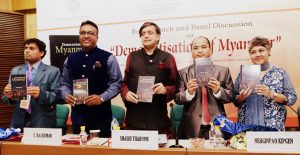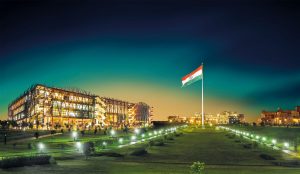- Policies to strengthen the relationship between India and Israel will be shaped by the initiatives taken by academic institutions says Dr Shahi Tharoor
- Politicians may want to build walls, universities need to be build bridges and strengthen collaborations emphasize academics at the conference
New Delhi, March 30th: Jindal Global University and Tel Aviv University in association with the Middle East Forum launched a two-day joint conference on ‘India-Israel Academic Dialogues: Political and Cultural Crossings’ at the India Habitat Centre, in New Delhi, today.
This two-day engagement is an initiative by the Jindal Centre for Israel Studies (JCIS) to understand the opportunities and challenges facing the two countries keeping in mind their political and cultural specificities. An ideational exchange between professors and students from the two universities, the conference aimed to understand the complex nature of both societies and explore possibilities of future collaborations in different fields.
Ambassador Daniel Carmon, Ambassador of Israel to India, in his inaugural speech said, “India and Israel need to know more about each other in terms of heritage, culture, values, and interests. I believe that what is being done today through this conference organized by the Jindal Centre for Israel Studies is working towards this goal. We have already come a long way, but much needs to be done to overcome the challenges ahead of us. Knowing one another will help in sustaining this relationship as we celebrate 25 years of this partnership. Security, food security, education, innovation, and water are some of the concerns that need to be addressed. Endeavours by academic institutes like the Jindal Centre for Israel Studies will certainly go a long way in deepening and widening this relationship. Young minds, guided by experienced minds, will strengthen academic excellence and build greater awareness of our commonalities and the lessons we can learn from one another.”
Talking of the deep historical relationship between the two countries, Dr Shashi Tharoor, Member of Parliament & Chairman of the Parliamentary Standing Committee on External Affair pointed out that academic institutions have immense power in strengthening bonds between the two countries.
He was however quick to add, “The relationship between the two countries should not be seen just in terms of counter terrorism and intelligence sharing. It needs to have public involvement and a much larger manifestation. Tourism and trade between the two countries should be encouraged and incentivized. Academic exchange and collaborations should be strengthened.”
Speaking at the inaugural session, Professor Raanan Rein, Elias Sourasky Professor of Latin American and Spanish History; Centre Head, S Daniel Abraham Center for International and Regional Studies and Vice-President, Tel Aviv University said, “India and Israel share similarities in values and challenges. Both have to deal with the fact that they are multi-ethnic, multi-cultural, and multi-religious and make this a strong basis for collaboration in academics.”
He emphasized that forums like this need to involve decision makers and prominent industry players to strengthen ties with universities in both countries. He went to say, “Politicians may want to build walls, but universities aim at building bridges. These collaborative ties of Jindal Global University and Tel Aviv University is crucial for the overall development of the countries and success of the education system. Traditionally most of our research ties have been with universities from North America and Europe, but in the last 10 years, we have taken a strategic decision to make India our top priority. In the last 5 years, the presence of Indian students in our universities has grown exponentially.”
The cross cultural dialogue between Indian and Israeli academics aimed at providing a better understanding of the complex nature of the two societies and explored common interests for future collaborations. In the Indian academic context, the Jindal Centre for Israel Studies at JSIA has been pioneering the field of Israel Studies its inception in 2012 and this conference is one of the many initiatives towards that objective.
It was on March 30, twenty-five years ago that India and Israel first established diplomatic ties. The Jindal Centre for Israel Studies at the Jindal School of International Affairs University chose this landmark day to host this conference.
Jindal Centre for Israel Studies at the Jindal School of International Affairs is the first of its kind dedicated to the field of Israel studies within the Indian academia and is committed to advancing India-Israel bilateral engagement.
Panellists at the two-day conference included diplomatic luminaries, academicians and political professionals. Prominent participants who shared their views and insights today included Professor P R Kumaraswamy, Centre for West Asian Studies, Jawaharlal Nehru University; Ditza Froim, Minister Counsellor, Head of Public Diplomacy, The Embassy of Israel in India; Bharat Karnad, Research Professor, National Security Studies, Centre for Policy Research, New Delhi; Kanchan Gupta, Political Analyst, Commissioning Editor & Commentator, ABP News; Professor Ilan Troen, AJC-API Visiting Scholar in JCIS-JSIA, President, Association for Israel Studies; Karl, Harry and Helen Stoll Professor of Israel Studies, Schusterman Center for Israel Studies, Brandeis University and Professor Emeritus, Ben-Gurion University in the Negev; Dr Rohee Dasgupta, Associate Professor and Convener, Jindal Centre for Israel Studies (JCIS), Jindal School of International Affairs (JSIA); Dr Khinvraj Jangid, Assistant Professor and Academic Coordinator, (JCIS), JSIA; Dr Pankaj Jha, Assistant Professor, Jindal School of International Affairs; Dr Silvia Bottega, Assistant Professor, Jindal School of International Affairs among others.


